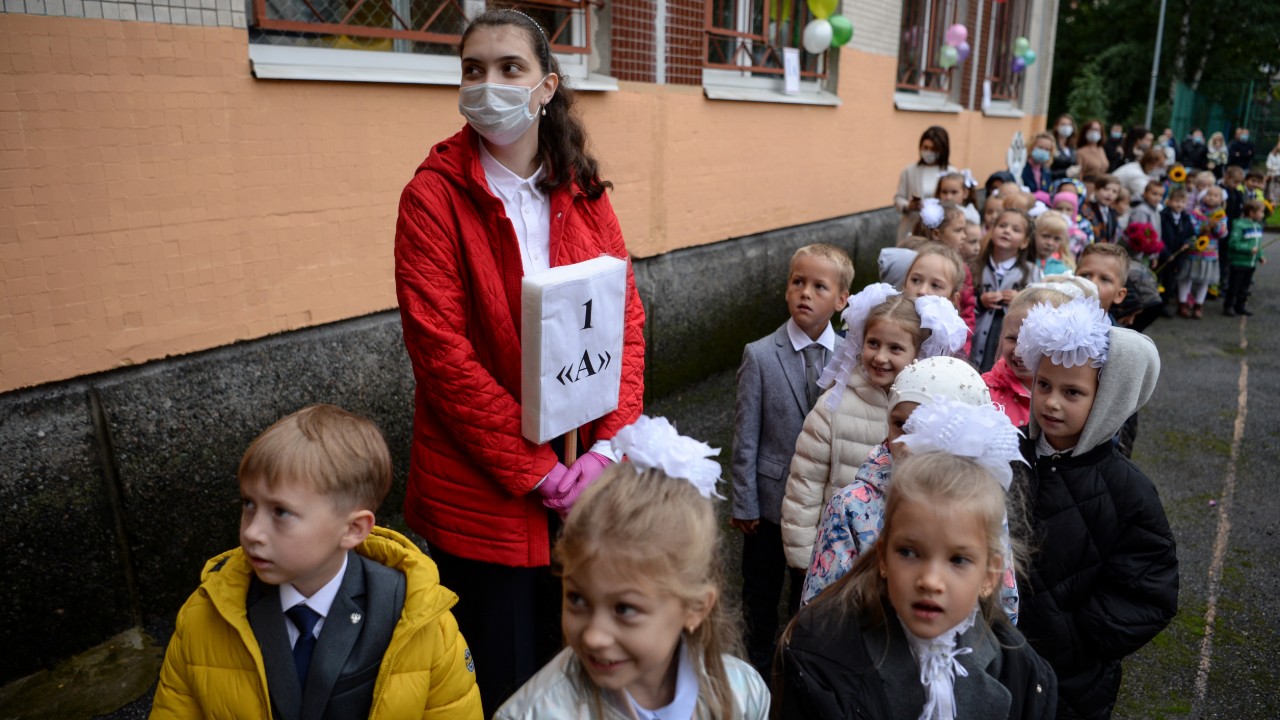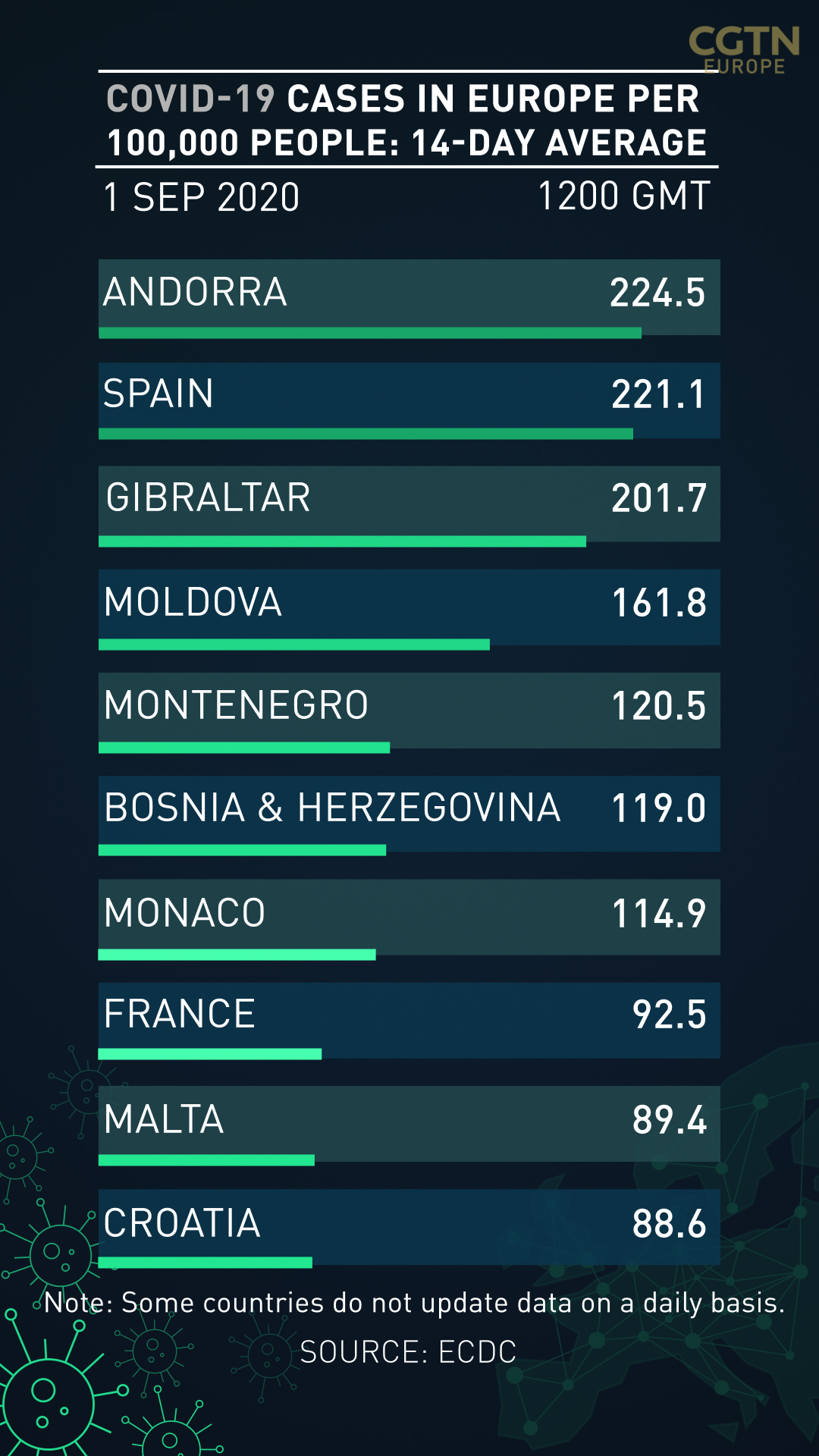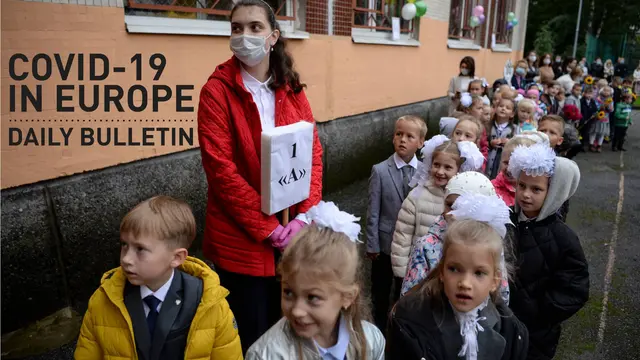TOP HEADLINES
•**Russia's total number of coronavirus cases passed the one million mark **on Tuesday, with 4,729 new infections taking the tally to 1,000,048. Russia's coronavirus crisis center said 123 new deaths had been confirmed in the past 24 hours.
•The number of new cases in Ukraine could reach 3,000 a day by the end of September , said prime minister Denys Shmyhal. Ukraine reported 2,088 cases on Tuesday and 2,141 on Monday, after a record last week of 2,481.
• Poland is banning direct flights from 44 countries including Spain, Israel and Romania from tomorrow. The U.S., Malta, Montenegro, Mexico, Brazil, Argentina and India are also on the list of countries, but local media reported that Russia and China had been removed from it.
•Rheumatoid arthritis drug Kevzara has failed trials as a COVID-19 treatment , French drug maker Sanofi said on Tuesday. Sanofi said Kevzara – which it produces with partner Regeneron – had produced adverse effects in trials on patients across the world.
•AstraZeneca has expanded its agreement with British drug maker Oxford Biomedica to make and supply the COVID-19 vaccine candidate AZD1222, in a deal that will pay the gene and cell therapy firm $20 million upfront and an additional $47 millionplus other costs by the end of 2021.
• Ireland's significant tightening of restrictions two weeks ago seems to be working , a senior health official said on Tuesday. "We've had a stable daily case count since 19 August," said Philip Nolan, chair of the Irish Epidemiological Modelling Advisory Group.
•Germany has improved its economic forecast for 2020 to a decline of 5.8 percent – half a point under previous expectations, but still the worst plunge since World War II. Economy minister Peter Altmaier said on Tuesday he doesn't expect sharp coronavirus-curbing measures to return in key sectors such as retail and industry.
•Spanish Prime Minister Pedro Sanchez has expressed "moderate optimism about the [economic] recovery of the country," with GDP growing more than 10 percent in the third quarter.
•Europe can live with COVID-19 without a vaccine by managing outbreaks with localized lockdowns , the World Health Organization's regional director Hans Kluge said on Tuesday, adding he did not expect a return to full national-level restrictions.
•French employment minister Elisabeth Borne has given companies around a week to adopt strict new rules on the compulsory wearing of face masks in the workplace –except for staff working alone or in relatively empty open-plan workspaces.
•Hungary is admitting tourists who test negative from its northerly neighbors Czechia, Slovakia and Poland, despite a general border ban on incoming travelers starting today, after Czech Prime Minister Andrej Babis appealed to Hungarian counterpart Viktor Orban.
•Spain's infection rate seems to be slowing slightly , with 23,000 new cases since Friday. Monday's new-case total was 2,489, down from the 21 August post-lockdown high of nearly 10,000 and last week's trend of around 8,000 to 9,000 per day.
•Two Paris St-Germain players are in quarantine after testing positive for COVID-19 . The French soccer club concealed their identity but media reports claim Argentine internationals Angel Di Maria and Leandro Paredes had cut short their holidays in Ibiza after positive tests.

Schoolchildren return to class in Saint Petersburg. The traditional ceremonial start of the academic year in Russia is different this year, with just the first and 11th classes in most schools returning today. /Kirill Kudryavtsev/AFP
ACROSS EUROPE
Stefan de Vries in Amsterdam
At a Tuesday night press conference in The Hague, Prime Minister Mark Rutte is expected to evaluate current measures but will not announce new restrictions to stop the spread of the coronavirus. Nightclubs hope they may reopen, but it’s not very likely the government will allow that. The venues have been closed for almost six months now and face bankruptcy.
Justice minister Ferdinand Grapperhaus has been heavily criticized after footage of his marriage last week became public. In the video, Grapperhaus and his guests do not respect the social distancing of 1.5 meters. The police now say it is harder to hand out fines since people are upset that they have to follow the rules, while their government isn't. The embarrassed minister invited police unions for a meeting to discuss the situation.
Yesterday, 506 people tested positive for COVID-19 in the Netherlands, a small decrease compared with the previous day.
Lucy Hough in Brussels
It's back to school for Belgian pupils from today, under a four-level color-coded risk system based on different risk scenarios.
Pupils will be returning under code yellow, which recommends a full five-day week, with mandatory mask wearing where social distancing cannot be observed. Red, the highest-risk scenario, would halve all secondary schools, with contact between pupils limited as much as possible.
The mandatory use of face masks applies to all pupils and staff in secondary schools, who may only remove their face mask during physical activity. Children will have to socialise in defined bubbles in the school cafeteria.
00:20

Andrew Wilson in UK
Tens of thousands of British holidaymakers now face potential disruption as the government considers reimposing quarantine measures on travelers from Portugal. It's only been two weeks since the country was put on the "safe" list but already coronavirus cases there have gone over 20 per 100,000 people.
Parliament reconvenes after the summer recess, with statements in the House of Commons from health minister Matt Hancock and education minister Gavin Williamson, with a possible appearance from the home affairs minister Priti Patel.
A new study has shown that people working from home spend on average 48 more minutes each day behind their desks and attend more meetings than they did before the pandemic. Before lockdown 6 percent of British employees worked from home; in April it was 43 percent.
Toni Waterman in Paris
September brings a new set of coronavirus restrictions in France. From Tuesday, masks are mandatory in offices and other workplaces as the government tries to reboot the economy while maintaining safety. The only exception is inside private offices. Health officials estimate that roughly a quarter of new clusters are linked to workplaces.
French school children over the age of 11 and teachers are also required to wear a mask when they return to the classroom on Tuesday. More than 12 million children are returning to school. The city of Lyon is also making masks compulsory in all public spaces.
FROM OUR GLOBAL COLLEAGUES
CGTN Europe podcast:
Notes on a pandemic: New hope for the planet
CGTN China:
HK's mass free COVID-19 screening: Lam urges locals to get tested
CGTN America:
U.S. COVID-19 cases top six million as Midwest, schools face outbreaks
CGTN Africa:
Kenya ministry of health ordered to publish COVID-19 deals amid graft scandal
**Sign up **
here
** to get the COVID-19 Europe bulletin sent directly to your inbox**
**CGTN Europe has been providing in-depth coverage of the novel coronavirus story as it has unfolded. **
Here
** you can read the essential information about the crisis.**
Source(s): Reuters
 简体中文
简体中文






